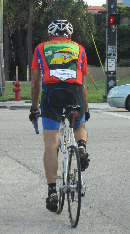Posts Tagged ‘energy’
Exercise requires energy, pure and simple. But where does it come from? The answer is glycogen. But what is it?
 When we digest food we’ve eaten, the carbohydrates are broken down by our bodies into glucose, and then the glucose is stored in our muscles . . . as glycogen. During periods of exercise, this process reverses, and glycogen converts to glucose once again, so that is may be used for energy. How long we “last” is greatly influenced by how much glycogen we have stored in our muscles.
When we digest food we’ve eaten, the carbohydrates are broken down by our bodies into glucose, and then the glucose is stored in our muscles . . . as glycogen. During periods of exercise, this process reverses, and glycogen converts to glucose once again, so that is may be used for energy. How long we “last” is greatly influenced by how much glycogen we have stored in our muscles.
Exercise that lasts less than 90 minutes is typical for most of us. Carbs typically provide 40-50% of our energy in the beginning stages of moderate exercise. What the body naturally stores will sustain you through a workout of this length.
But as the intensity of physical activity increases, the body’s carbohydrate consumption increases too. For events over 90 minutes, eat a heavy-carb diet for 2-3 days prior.
Picture the muscles like porous rocks. The more glycogen is filling all those crevices, the more energy reserves we have to draw upon. This is why cyclists, marathoners, triathletes, soccer players and other endurance athletes excel when they’ve pre-loaded for 2-3 days with about 70% carbs. Glycogen is the fuel which sustains the body in highly physical situations.
Have you heard the term “hitting the wall?” This refers to an actual event in the body, the depletion of glycogen. Once stores are gone, energy is truly kaput; you have no way to generate more.
Don’t assume you should eat a high-carb diet all the time, though, even if you exercise heavily. Once glycogen fills all the areas where reserves can be stored, any extra that is produced is stored as body fat. Eating too many carbs causes this excessive glycogen production.
Another danger of overdoing carb consumption: you can unwittingly “train” your body not to utilize essential fatty acids that come from fat. Not only does fat transport cholesterol and play a role in blood clotting, it helps us absorb vitamins and produce hormones.
Conversely, eating too few carbs forces the body to use protein for energy. The body will actually start to break down protein – the building blocks for muscles, bone, and other tissues – meaning you put yourself into a sort of self-cannibalization. Your body starts to feed on its own muscles and you lose muscle mass. This is also tough on kidneys. Not a pretty thought.
So strike a happy balance between protein, carbs and fat, and remember lean protein, high fiber and unsaturated fats as your first choice. It’s all about balance and timing: my 80/20 rule. Athletic training is 80% nutrition, 20% training. Get the food right, you have a bonafide mega-advantage over the competition.
Michelle Ciuffetelli, a Certified Personal Trainer in Fort Myers, Florida, says her favorite carbs are oatmeal (filling and a good source of fiber); sweet potatoes; fruit (a great snack); Arnold Sandwich Thins (good fiber); and Flat Out wraps (taste great, can wrap anything).
Now get moving. That’s a wrap!
 What cyclists eat and drink determines how fast and how far they can ride. What are your goals? Recreation, competitive racing, or heavy-duty triathlons? Even recreational riders should pay attention to their diet; maximize your ride and get the body you want. All athletes and exercisers need energy to function.
What cyclists eat and drink determines how fast and how far they can ride. What are your goals? Recreation, competitive racing, or heavy-duty triathlons? Even recreational riders should pay attention to their diet; maximize your ride and get the body you want. All athletes and exercisers need energy to function.
Many cyclists avoid caffeine, knowing it’s a diuretic, but here’s a surprise. During endurance exercise, the dehydrating qualities of caffeine are practically nil with small amounts of caffeine. And studies have shown that it may help the body burn fat, rather than carbohydrate reserves.
Coffee is not an ideal source of caffeine for exercisers or athletes – therefore, don’t think you can justify your Starbucks habit. We have only 1,500-3,000 calories of reserve carbs, but the body stores 70,000 fat calories at any given time, so burn, baby, burn.
Each hour of an intense bike ride will use 500-1,000 calories. Your overall protein needs will increase during exercise; supplement at 1.2-2. g protein per kilogram of body weight per day depending on your intensity and length of exercise.
For endurance events, you can increase your carbs three days prior. This maximizes the body’s glycogen stores. While you ride, you need 30-60 g of carbs for each hour beyond the first hour. An energy bar works.
Practice eating while you ride and don’t change your food choice on race day. Remember, fat can contribute as much as 75 percent of your energy demands during endurance training. Keep foods simple.
During a ride in hot weather, the body’s ability to digest becomes compromised. Liquid foods avoid this situation, and keep you speeding along without much hassle. Certain energy drinks can fill the bill, as does an Ensure protein drink, available in any drug store.
Ensure also comes in powder form; having baggies of it allows you to add it to water, drink a meal, and continue on. You can also mix fruit juice and water for a source of hydration, carbs and sugar for your blood.


Follow Us!